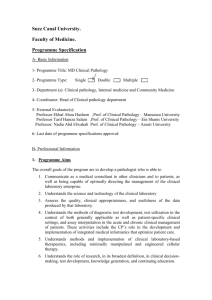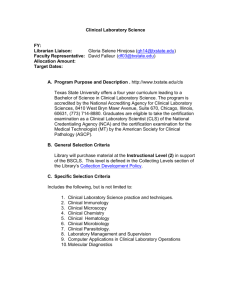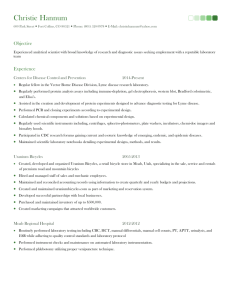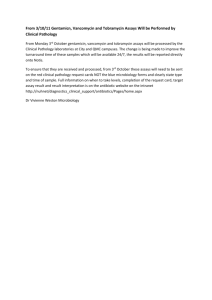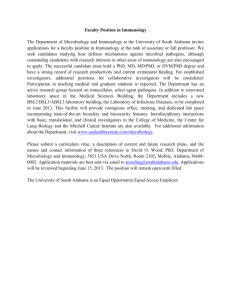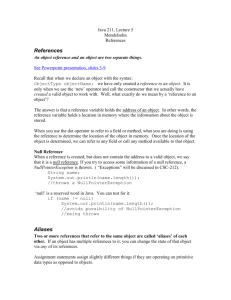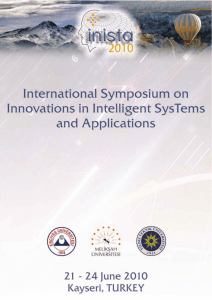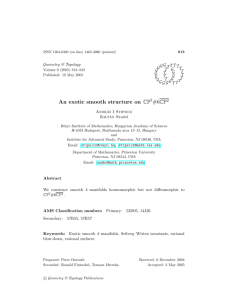1- Programme Title: Msc Clinical Pathology
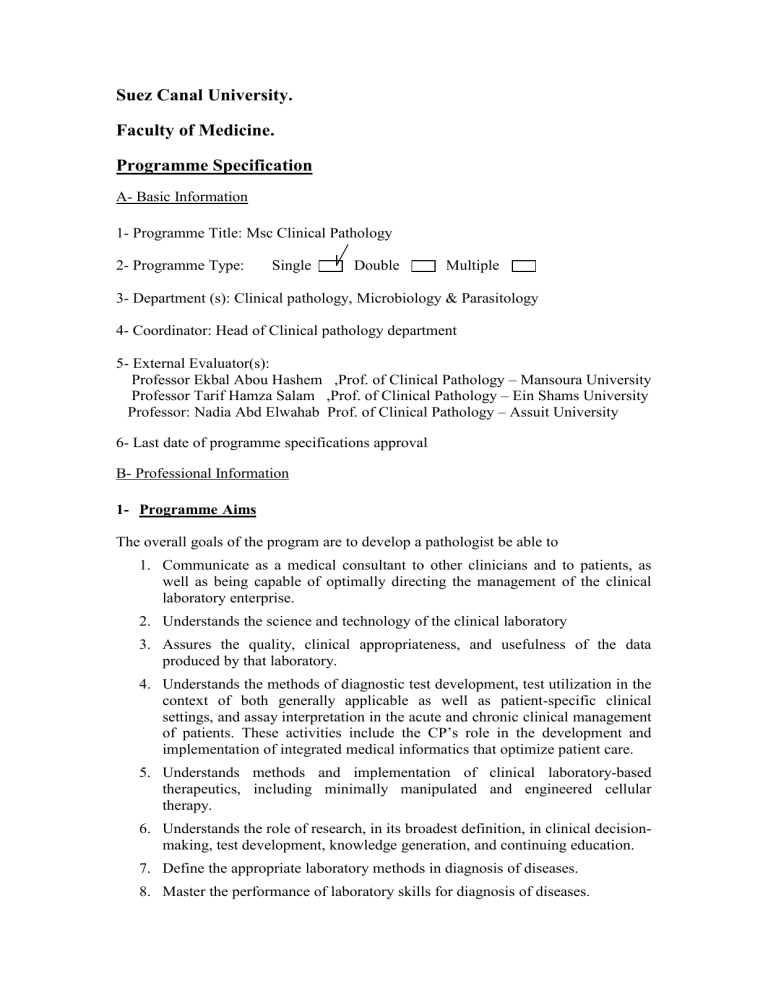
Suez Canal University.
Faculty of Medicine.
Programme Specification
A- Basic Information
1- Programme Title: Msc Clinical Pathology
2- Programme Type: Single Double Multiple
3- Department (s): Clinical pathology, Microbiology & Parasitology
4- Coordinator: Head of Clinical pathology department
5- External Evaluator(s):
Professor Ekbal Abou Hashem ,Prof. of Clinical Pathology – Mansoura University
Professor Tarif Hamza Salam ,Prof. of Clinical Pathology – Ein Shams University
Professor: Nadia Abd Elwahab Prof. of Clinical Pathology – Assuit University
6- Last date of programme specifications approval
B- Professional Information
1Programme Aims
The overall goals of the program are to develop a pathologist be able to
1.
Communicate as a medical consultant to other clinicians and to patients, as well as being capable of optimally directing the management of the clinical laboratory enterprise.
2.
Understands the science and technology of the clinical laboratory
3.
Assures the quality, clinical appropriateness, and usefulness of the data produced by that laboratory.
4.
Understands the methods of diagnostic test development, test utilization in the context of both generally applicable as well as patient-specific clinical settings, and assay interpretation in the acute and chronic clinical management of patients. These activities include the CP’s role in the development and implementation of integrated medical informatics that optimize patient care.
5.
Understands methods and implementation of clinical laboratory-based therapeutics, including minimally manipulated and engineered cellular therapy.
6.
Understands the role of research, in its broadest definition, in clinical decisionmaking, test development, knowledge generation, and continuing education.
7.
Define the appropriate laboratory methods in diagnosis of diseases.
8.
Master the performance of laboratory skills for diagnosis of diseases.
2- Intended Learning Outcomes (ILOs) a- Knowledge and Understanding:
By the end of the program the students should be able to a1 Use all relevant information resources to acquire and evaluate evidence-based information. Demonstrate proficiency in evaluating and presenting findings from appropriate peer-reviewed journals. a2- Use mathematics and statistics as appropriate to laboratory testing; understand and implement quality control (QC) and quality assurance procedures as required. a3- Demonstrate sufficient knowledge to determine clinically optimal yet costeffective testing and laboratory-based strategies, including issues of turn-around time, test menu construction, and in-house vs referral diagnostic testing. a4- Recognize the unique aspects of laboratory medicine practice as modified by patient age and other patient population characteristics, especially aspects of pediatric and geriatric practice. b- Intellectual Skills b1- Demonstrate the ability to critically assess the scientific literature.. b2- Develop personally effective strategies for the identification and remediation of gaps in medical knowledge needed for effective practice. b3- Use laboratory problems and clinical inquiries to identify process improvements to increase patient safety. b4- Implement principles of clinical research design c3- Demonstrate skills in obtaining informed consent, including effective communication to patients about procedures, alternative approaches, and possible complications of laboratory-based patient care diagnostic and therapeutic activities, such as those related to transfusion medicine. c- Professional and Practical Skills c1- Demonstrate compassion: be understanding and respectful of patients, their families, and the staff and physicians caring for them. c2- Interact with others without discriminating on the basis of religious, ethnic, sexual, or educational differences. c3- Demonstrate positive work habits, including punctuality, dependability, and professional appearance. c4- Demonstrate principles of confidentiality with all information transmitted both during and outside of a patient encounter. c5- Demonstrate knowledge of regulatory issues pertaining to the use of human subjects in research. c6- Perform all laboratory tests required in the course specifications
c7- Interpret the results of all laboratory tests mentioned in the course specification in relation to the clinical presentation of patients c8- Demonstrate skills in obtaining informed consent, including effective communication to patients about procedures d- General and Transferable Skills d1- Demonstrate the ability to provide direct communication to the referring physician or appropriate clinical personnel when interpretation of a laboratory assay reveals an urgent, critical, or unexpected finding and document this communication in an appropriate fashion. d2- Choose effective modes of communication (listening, nonverbal, explanatory, questioning) and mechanisms of communication (face-to-face, telephone, e-mail, written), as appropriate. d3- Work effectively in a team d4- Present information clearly in electronic forms
3- Academic Standards
External References for Standards (Benchmarks)
Academy of Clinical Laboratory Physicians and Scientists [BR Smith et al.
Curriculum Content and Evaluation of Resident Competency in Clinical Pathology
(Laboratory Medicine)
4 - Programme duration: 2 academic years
5 - Programme Courses
5.1- Level/Year of Programme: 1 st part MSc
Code
No.
Course Title No. of hours /week
Lect. Lab. Tuto
Programme ILOs
Covered
(By No.)
2 4 a3-4,b2,c3,4,6,7 CP2.1.1 Microbiology &
Immunology
CP2.1.2 Parasitology
CP2.2.1 Hematology
CP2.2.2 Clinical chemistry
2
1
2
3
2
4 a3-4,b2,c3,4,6,9 a3-4,b,c,d a,b,c,d
5.2 Level/Year of Programme: second part MSc
Code
No.
Course Title No. of hours /week Programme ILOs
Covered
Lab. Tuto (By No.)
CP2.2.1 Hematology
Lect.
1
CP2.2.2 Clinical chemistry 4
2
8
1/2w
1/2w a3-4,b,c,d a,b,c,d
CP2.2.3 Applied
Immunology and microbiology
2 4 1/2w a3-4,b,c,d
5.3 Thesis: A faculty senior & junior supervisor from the staff members are nominated by the department council to prepare a proposal of the thesis protocol after the selection of a subject that is complementary to the research plans of the department.
Data collection, methodologies, study question, time table, ethical considerations and budget are formulated by the candidate under guidance of his supervisors into a research project. The research protocol is then peer reviewed by two different stuff members nominated by the Head of the department who share their ideas and comments with the supervisors to reach to the final form.
The research protocol is discussed then openly in one of the department councils to be approved and diverted to the Faculty research committee where it is subjected to a critical appraisal to meet the research basic standards set by the committee. The final approvals of the research protocol are then issued by the committee of post graduate studies, the Faculty and University Council to be registered.
6Programme Admission Requirements
Bachelor of Medicine & surgery with minimum good grade & very good in
Medicine
7- Regulations for Progression and Programme Completion
First part (40%) 300 marks
Passing level 60% of total marks for each of Parasitology and microbiology.
Second part (60%) 500 marks
Passing level 60% of total for each of Clinical Chemistry, Clinical
Hematology and applied Immunology and microbiology
Written Oral Practical
Hematology
Clinical Chemistry
80
80
40
40
80
80
Immunology/microbiology 40 20 40
Thesis/Assay: Approvement by a committee of internal and external examiners is required for Msc degree
8- Evaluation of Programme Intended Learning Outcomes
Evaluator
1Students
2- Stakeholders (Employers)
3-External Evaluator(s) (External
Examiner(s)
Tool
Questionnaires
Interviews
Attending exam. (using checklist and/or rating scale)
Annex 1
Attach Course Specifications
